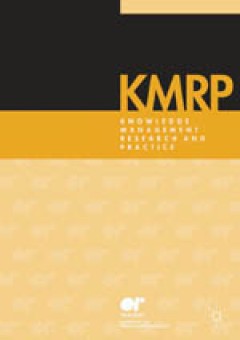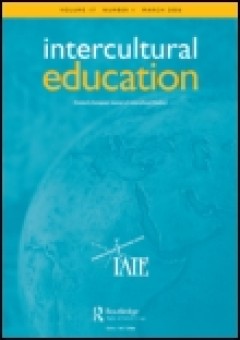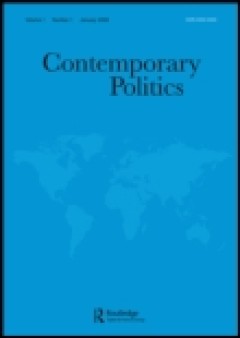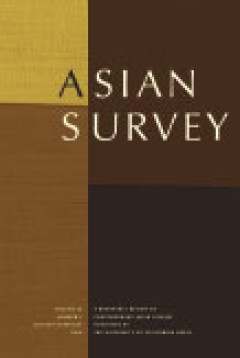Filter by

From ivory towers to online bazaars? The internet, social media and competing…
In line with the development of new media, newspaper companies are facing drastic changes in their competitive environment. Managing change requires both new capabilities and new ways of thinking. Organizational learning could be seen in terms of increasing shared organizational knowledge through changing social practices, which in turn consist of discourses. In this article we investigate the …
- Edition
- Vol. 8, No. 2, June 2010. pp. 135–145
- ISBN/ISSN
- 14778238
- Collation
- -
- Series Title
- Knowledge Management Research & Practice
- Call Number
- -

Relational effects on knowledge integration: the differential effects on sear…
The paper investigates the effect of homophily and status differences on knowledge integration among individuals involved in product development activities. By distinguishing between search and transfer as two integral parts of the knowledge integration process, the paper addresses the question of how cognitive and motivational barriers to knowledge integration operate differently through the s…
- Edition
- Vol. 8, No. 2, June 2010. pp. 146–160
- ISBN/ISSN
- 14778238
- Collation
- -
- Series Title
- Knowledge Management Research & Practice
- Call Number
- -

Knowledge management technology-in-practice: a social constructionist analysi…
This paper argues that Knowledge Management Technology (KMT) is socially constructed in use based on the affordances and constraints of the technology artefact. Since many Knowledge Management (KM) systems are introduced with vague purposes (such as to improve knowledge sharing) it is therefore their affordances and constraints which strongly shape the socially constructed �KMT-in-practice�. Th…
- Edition
- Vol. 8, No. 2, June 2010. pp. 161–172
- ISBN/ISSN
- 14778238
- Collation
- -
- Series Title
- Knowledge Management Research & Practice
- Call Number
- -

Knowledge of the natural and the social: how are they different and what do t…
Knowledge of the natural and the social are irreducibly different yet have much in common. The differences lie at the levels of complexity they engage, modes of explanation they adopt, investigation aims they allow and whether they assert a �double hermeneutic� effect to the behaviour of the studied objects. Knowledge are in common in that they are all construed out of available resources, just…
- Edition
- Vol. 8, No. 2, June 2010. pp. 173–188
- ISBN/ISSN
- 14778238
- Collation
- -
- Series Title
- Knowledge Management Research & Practice
- Call Number
- -

Making the past relevant to future generations. The work of the Anne Frank Ho…
This paper provides the context and outlines the barriers and opportunities for developing promising Holocaust education programmes in Latin America, especially working with diverse communities and societies. In particular, the conflictual history of Latin American and recent democratization processes present opportunities for educational work. It is argued that teaching about the history of th…
- Edition
- Volume 21, Issue S1 2010 , pages S7 - S15
- ISBN/ISSN
- 14675986
- Collation
- -
- Series Title
- Intercultural Education
- Call Number
- -

'But, apartheid was also genocide … What about our suffering?' Teaching the…
Participants in South African educator workshops focusing on teaching the Holocaust and the 1994 genocide in Rwanda frequently declare that apartheid was also genocide. These comments seem like a cry to recognize that South Africa's past of human-rights abuses and pain also deserves a definition, and genocide seems to be the desired title of ultimate suffering. How do you teach the Holocaust an…
- Edition
- Volume 21, Issue S1 2010 , pages S17 - S26
- ISBN/ISSN
- 14675986
- Collation
- -
- Series Title
- Intercultural Education
- Call Number
- -

Moving beyond the toolbox: teaching human rights through teaching the Holocau…
What role might Holocaust education play in post-apartheid South Africa? What role might the teacher of the Holocaust play? This paper examines the considerations that have shaped the programmes developed by the South African Holocaust Foundation to support South African teachers teaching about the Holocaust. This programme is set against a society removed in time and space from the history of …
- Edition
- Volume 21, Issue S1 2010 , pages S27 - S31
- ISBN/ISSN
- 14675986
- Collation
- -
- Series Title
- Intercultural Education
- Call Number
- -

The problem with using historical parallels as a method in Holocaust and geno…
Teaching the Holocaust in multicultural classrooms and in places which have experienced mass violence raises the question of whether specific methods of teaching are required. One of the answers is that Holocaust education in these cases should facilitate the creation of parallels and similarities between past events and the experiences of the learners. This concept is contrasted with a histori…
- Edition
- Volume 21, Issue S1 2010 , pages S33 - S40
- ISBN/ISSN
- 14675986
- Collation
- -
- Series Title
- Intercultural Education
- Call Number
- -

Teaching about the Holocaust in multicultural societies: appreciating the lea…
The discussion in Germany regarding teaching about the Holocaust in multicultural classrooms mirrors an ongoing debate about the reality of present-day Germany: instead of dealing with the many learners with non-German backgrounds residing in the country, various educators have instead complained about problems relating to general discipline or a lack of motivation on the part of the learners t…
- Edition
- Volume 21, Issue S1 2010 , pages S41 - S49
- ISBN/ISSN
- 14675986
- Collation
- -
- Series Title
- Intercultural Education
- Call Number
- -

Tolerance education in Morocco. 'Anne Frank: A History for Today': learning a…
This paper describes recent developments in the field of history education and human rights education in Morocco. Educational reform in Morocco is ongoing and includes measures such as mandating that all schools create after-school Human Rights Clubs. These developments are then related to the possibility of teaching about the history of the Holocaust within this particular context. As a case s…
- Edition
- Volume 21, Issue S1 2010 , pages S51 - S59
- ISBN/ISSN
- 14675986
- Collation
- -
- Series Title
- Intercultural Education
- Call Number
- -

Finding common ground in education about the Holocaust and slavery
In scholarship on the Holocaust and the history of slavery, historians and other academics have, over the years, developed both abstract concepts and concrete activities. Teachers and developers of educational materials have translated complex events into digestible entities fit for use within and outside the classroom, often including new insights and new approaches in their teaching. This pap…
- Edition
- Volume 21, Issue S1 2010 , pages S61 - S69
- ISBN/ISSN
- 14675986
- Collation
- -
- Series Title
- Intercultural Education
- Call Number
- -

Thaksin Shinawatra and the reshaping of Thai politics
Twice elected prime minister of Thailand at the head of his Thai Rak Thai Party, telecommunications magnate Thaksin Shinwatra was controversial in office. Since his government was overthrown by a September 2006 military coup backed by the palace, conservatives, and a broad coalition of opponents, Thaksin has remained at the centre of Thailand's continuing political turmoil. This paper examines …
- Edition
- Volume 16, Issue 2 June 2010 , pages 119 - 133
- ISBN/ISSN
- 13569775
- Collation
- -
- Series Title
- Contemporary Politics
- Call Number
- -

Islamization in Malaysia: processes and dynamics
Over the past three decades Malaysian society has undergone radical change and transformation. On one level this has been brought about by the country's rapid economic transformation, but equally significant has been the deepening Islamization of the country. From banking to law, from dress to education policy, almost no sector of Malaysian society has escaped the growing influence of Islam upo…
- Edition
- Volume 16, Issue 2 June 2010 , pages 135 - 151
- ISBN/ISSN
- 13563890
- Collation
- -
- Series Title
- Contemporary Politics
- Call Number
- -

The twenty-first century Armed Forces of the Philippines: orphan of counter-i…
This article examines the factors that account for the Armed Forces of the Philippines's (AFP) never-ending involvement in many wars of the third kind. It discusses the essence of counter-insurgency warfare or low-intensity conflict in the Philippine setting. The article then notes that the disruption in the US military assistance after 1992, the AFP's inability to modernize, and its continuous…
- Edition
- Volume 16, Issue 2 June 2010 , pages 153 - 171
- ISBN/ISSN
- 13569775
- Collation
- -
- Series Title
- Contemporary Politics
- Call Number
- -

Stakeholder security: the new western way of counter-terrorism?
This article explores the ways in which Western states have adapted their counter-terrorism strategies to meet the demands of a post-9/11 era. Focusing on the USA and UK as illustrative case studies, this article charts the emergence of a new, complex topography of security measures aimed at confronting the threat of unconventional violence from above and below. Of particular interest is the co…
- Edition
- Volume 16, Issue 2 June 2010 , pages 173 - 188
- ISBN/ISSN
- 13569775
- Collation
- -
- Series Title
- Contemporary Politics
- Call Number
- -

A conservative convergence? The differences and similarities of the conservat…
This paper compares and contrasts the conservative right in both the Czech Republic and Poland in its historical and contemporary contexts. It argues that the conservative right is strong in both these countries and that they share many similar political features. However, there are also numerous differences between the conservative right in these nations. The reasons for these dissimilarities …
- Edition
- Volume 16, Issue 2 June 2010 , pages 189 - 207
- ISBN/ISSN
- 13569775
- Collation
- -
- Series Title
- Contemporary Politics
- Call Number
- -

The carcass of dead policies: lessons for Obama in dealing with Iran
The United States has spent 30 years clinging to variations of the same policy towards Iran, to no avail. 'Doing the right thing' has proved perplexing, complicated and, ultimately, elusive. In 1979, the United States struggled to come to terms with Iran's transformation from consort to adversary. Washington had difficulty fitting Iran into the hierarchy of regional and international priorities…
- Edition
- Volume 16, Issue 2 June 2010 , pages 209 - 223
- ISBN/ISSN
- 13569775
- Collation
- -
- Series Title
- Contemporary Politics
- Call Number
- -

Nuclear Revival in Post-Suharto Indonesia
Indonesia is planning to build a nuclear power plant to meet soaring demand for energy. Opposing this policy, an anti-nuclear alliance is emerging from grassroots groups driven by distrust of the government's ability to handle high-risk technology. This article explores the contemporary politics of Indonesia's nuclear power program.
- Edition
- Vol. 50, No. 2, March/April 2010, Pages 265–286
- ISBN/ISSN
- 00044687
- Collation
- -
- Series Title
- Asian Survey
- Call Number
- -

Agents of Taiwan-China Unification? The Political Roles of Taiwanese Business…
The political roles of Taiwanese business people (taishang) in cross-strait relations have been increasingly noteworthy under Hu Jintao's policy of "counting on the Taiwanese people." But contrary to widely accepted allegations, this paper argues that attempts by China to use Taiwanese business people as a means to gain political leverage over Taiwan will probably not pan out as a successful st…
- Edition
- Vol. 50, No. 2, March/April 2010, Pages 287–310
- ISBN/ISSN
- 00044687
- Collation
- -
- Series Title
- Asian Survey
- Call Number
- -

The Transformation of Mongolia's Political System: From Semi-parliamentary to…
This paper outlines Mongolia's regime transformation, focusing on its 2000 constitutional amendments that turned Mongolia into a parliamentary system, albeit with a popularly elected fixed-term president. The paper also emphasizes the prominence of institutional authority to form the executive in determining regime type, and makes an effort to clarify Duverger's second criterion of semi-preside…
- Edition
- Vol. 50, No. 2, March/April 2010, Pages 311–334
- ISBN/ISSN
- 00044687
- Collation
- -
- Series Title
- Asian Survey
- Call Number
- -
 Computer Science, Information & General Works
Computer Science, Information & General Works  Philosophy & Psychology
Philosophy & Psychology  Religion
Religion  Social Sciences
Social Sciences  Language
Language  Pure Science
Pure Science  Applied Sciences
Applied Sciences  Art & Recreation
Art & Recreation  Literature
Literature  History & Geography
History & Geography